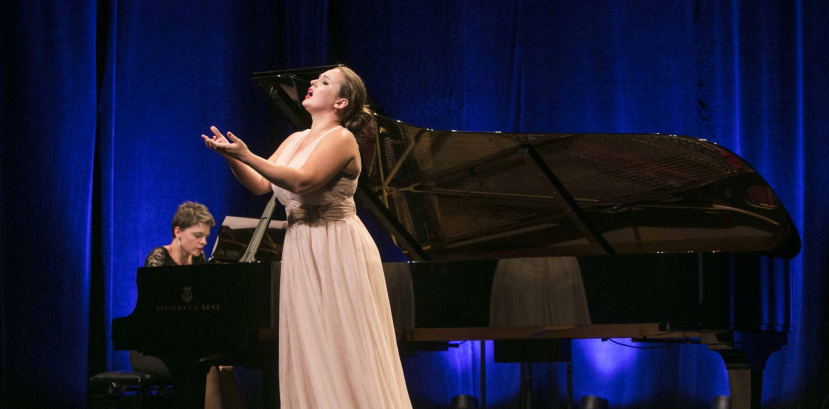Reviews written by Barbara Zamek of auditions of participants in the 2nd stage of the 19th Ada Sari International Vocal Artistry Competition.
Jakub Folta | countertenor
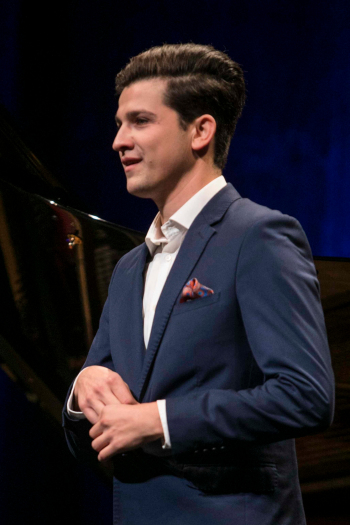 The morning of the 2nd stage of the Competition began with a romantic piece by W. Wrzesińska „Na lipę” performed by countertenor Jakub Foltak and Aleksander Chodacki at the piano. The subtle playing of the pianist beautifully complemented the ethereal sound of the singer's voice. The second piece, „Quae moerebat et dolebat” by G.B. Pergolesi, the soloist, sang stylishly and gracefully. As the last piece, he presented R. Hahn's song „A Chloris”, again enchanting with a charming performance. Jakub Foltak led the melodic line musically, with a slightly aerated sound. Throughout the performance, the soloist did not go beyond piano and mezzo forte dynamics.
The morning of the 2nd stage of the Competition began with a romantic piece by W. Wrzesińska „Na lipę” performed by countertenor Jakub Foltak and Aleksander Chodacki at the piano. The subtle playing of the pianist beautifully complemented the ethereal sound of the singer's voice. The second piece, „Quae moerebat et dolebat” by G.B. Pergolesi, the soloist, sang stylishly and gracefully. As the last piece, he presented R. Hahn's song „A Chloris”, again enchanting with a charming performance. Jakub Foltak led the melodic line musically, with a slightly aerated sound. Throughout the performance, the soloist did not go beyond piano and mezzo forte dynamics.
Michał Janicki | baritone
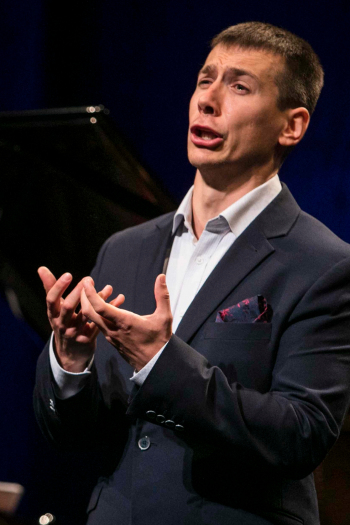 Baritone Michał Janicki set a completely different mood with his performance. He sang recitative and aria about lost love „Or dove fuggo io mai? / Ah, per sempre io ti perdei” by V. Bellini with a nice legato phrasing, finishing each phrase with care. Then he gave a great show of acting by performing a song by M.P. Łopacki, „Lament Adama”, to which he wrote the lyrics himself. He clearly outlined the figure of a man torn by strong emotions, pouring out his regrets on the opposite sex. The change to a nostalgic mood took place in the third piece - B. Smetana’s „Jen jediná”. The soloist took advantage of the dynamic differences and interpreted the text with great commitment. At the end of the aria, he sang perhaps too emotionally: his voice did not sound as free in the high notes as in the other registers.
Baritone Michał Janicki set a completely different mood with his performance. He sang recitative and aria about lost love „Or dove fuggo io mai? / Ah, per sempre io ti perdei” by V. Bellini with a nice legato phrasing, finishing each phrase with care. Then he gave a great show of acting by performing a song by M.P. Łopacki, „Lament Adama”, to which he wrote the lyrics himself. He clearly outlined the figure of a man torn by strong emotions, pouring out his regrets on the opposite sex. The change to a nostalgic mood took place in the third piece - B. Smetana’s „Jen jediná”. The soloist took advantage of the dynamic differences and interpreted the text with great commitment. At the end of the aria, he sang perhaps too emotionally: his voice did not sound as free in the high notes as in the other registers.
Esther Kopel | soprano
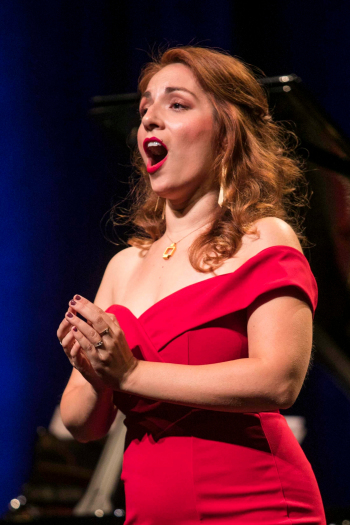 The Israeli soprano Esther Kopel started her performance with R. Leoncavallo’s recitative and aria „Qual fiamma / Stridono lassù”, in which she presented secure top notes and great diction. Both in this piece and in E. Bat’s song „Hahakara Sheli”, the singer had intonation issues. The third piece, recitative and aria „Celui dont la parole / Il est doux, il est bon” by J. Massenet, she performed more consistently in terms of intonation. Overall, the whole performance was lacking legato phrasing and volume in the lower register.
The Israeli soprano Esther Kopel started her performance with R. Leoncavallo’s recitative and aria „Qual fiamma / Stridono lassù”, in which she presented secure top notes and great diction. Both in this piece and in E. Bat’s song „Hahakara Sheli”, the singer had intonation issues. The third piece, recitative and aria „Celui dont la parole / Il est doux, il est bon” by J. Massenet, she performed more consistently in terms of intonation. Overall, the whole performance was lacking legato phrasing and volume in the lower register.
Wiktor Kowalski | baritone
 Baritone Wiktor Kowalski made a surprising choice when it comes to a song written by a composer born after 1950. „Czy Cię jeszcze odnajdę najdroższa” by P. Grajnert is monotonous, based on a simple, repetitive melody that prevents the soloist from presenting himself in an interesting way. In the second piece, „Mein Sehnen, mein Wähnen” by E.W. Korngold, the singer, showed a beautiful timbre and musical sensitivity, but his voice did not sound at ease. There were also errors in the pronunciation of the German language. In U. Giordano’s aria „Nemico della Patria” the soloist had problems with the intonation.
Baritone Wiktor Kowalski made a surprising choice when it comes to a song written by a composer born after 1950. „Czy Cię jeszcze odnajdę najdroższa” by P. Grajnert is monotonous, based on a simple, repetitive melody that prevents the soloist from presenting himself in an interesting way. In the second piece, „Mein Sehnen, mein Wähnen” by E.W. Korngold, the singer, showed a beautiful timbre and musical sensitivity, but his voice did not sound at ease. There were also errors in the pronunciation of the German language. In U. Giordano’s aria „Nemico della Patria” the soloist had problems with the intonation.
Kateryna Levytska | soprano
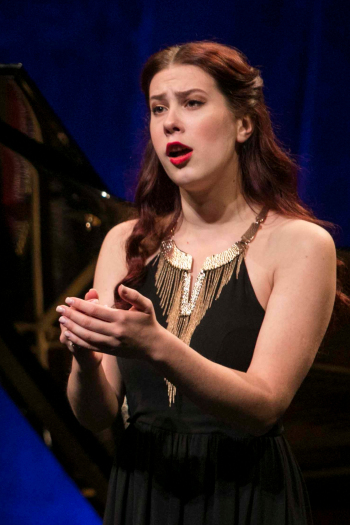 Ukrainian soprano Kateryna Levytska began her performance in the second stage of the Competition with G.F. Händel’s aria „Tornami a vagheggiar”. She presented efficient, light coloratures and a graceful interpretation. Then she sang a lullaby by O. Bezborodko - „A Cradle Song”. Unfortunately, it was difficult to understand the words of the song. In both works the upper notes did not sound as free as in the following piece - „Gualtier maldè / Caro nome” by G. Verdi. The soloist sang very sweetly, however she did not diversify the pace and dynamics sufficiently, concentrating only on the beauty of the sound. She had some intonation issues at times.
Ukrainian soprano Kateryna Levytska began her performance in the second stage of the Competition with G.F. Händel’s aria „Tornami a vagheggiar”. She presented efficient, light coloratures and a graceful interpretation. Then she sang a lullaby by O. Bezborodko - „A Cradle Song”. Unfortunately, it was difficult to understand the words of the song. In both works the upper notes did not sound as free as in the following piece - „Gualtier maldè / Caro nome” by G. Verdi. The soloist sang very sweetly, however she did not diversify the pace and dynamics sufficiently, concentrating only on the beauty of the sound. She had some intonation issues at times.
Avram Benjamin Molonfalean | bass
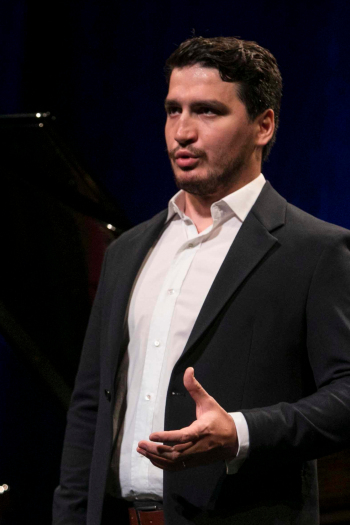 For his first piece, Romanian bass Avram Benjamin Molonfalean presented B. Nikola’s song „Iubind in taina”. Like many participants, he chose a work by his native contemporary composer. His interpretation was saturated with emotions. Then, the singer performed C.M. von Weber’s aria Schweig, schweig. The soloist has a voice with a dark and rich timbre. The lower notes sounded beautifully, while in the higher registers the voice sounded less at ease and there was an unnatural vibration in it. The same happened in the third piece - recitative and aria „Studia il passo mio figlio / Come dal ciel precipita” by G. Verdi.
For his first piece, Romanian bass Avram Benjamin Molonfalean presented B. Nikola’s song „Iubind in taina”. Like many participants, he chose a work by his native contemporary composer. His interpretation was saturated with emotions. Then, the singer performed C.M. von Weber’s aria Schweig, schweig. The soloist has a voice with a dark and rich timbre. The lower notes sounded beautifully, while in the higher registers the voice sounded less at ease and there was an unnatural vibration in it. The same happened in the third piece - recitative and aria „Studia il passo mio figlio / Come dal ciel precipita” by G. Verdi.
Zuzanna Nalewajek | mezzo-soprano
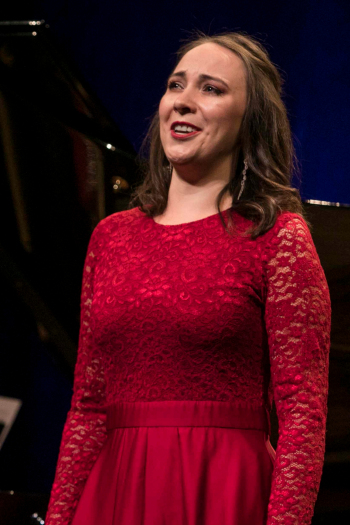 „Wie Du warst! Wie Du bist!” By R. Strauss was the first piece presented in the second stage by mezzo-soprano Zuzanna Nalewajek. She interpreted the text beautifully, both in terms of acting and music. The sound of each phrase was subordinated to the emotion that was hidden behind the words of Octavian. Then, she sang W. Rhim’s song „Hochroth” with no less expressiveness. But the real gem was the performance of the last piece - „Żydek” by M Weinberg. She presented the moving text in an extremely engaging way. The artist has something electrifying about her, which makes the listener enter the world she created in full concentration. Only occasionally the natural color of her voice was disrupted and sounded less beautiful.
„Wie Du warst! Wie Du bist!” By R. Strauss was the first piece presented in the second stage by mezzo-soprano Zuzanna Nalewajek. She interpreted the text beautifully, both in terms of acting and music. The sound of each phrase was subordinated to the emotion that was hidden behind the words of Octavian. Then, she sang W. Rhim’s song „Hochroth” with no less expressiveness. But the real gem was the performance of the last piece - „Żydek” by M Weinberg. She presented the moving text in an extremely engaging way. The artist has something electrifying about her, which makes the listener enter the world she created in full concentration. Only occasionally the natural color of her voice was disrupted and sounded less beautiful.
Stanisław Napierała | tenor
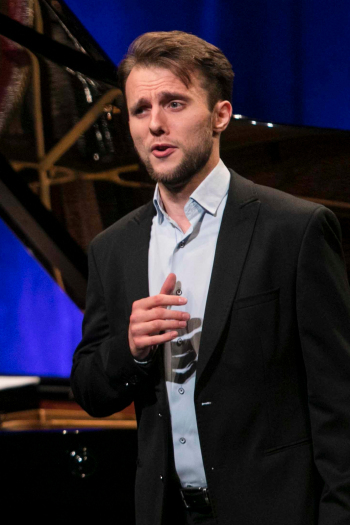 At the beginning of his performance, Tenor Stanisław Napierała chose the song „Outside this house the world has changed” by S. Barber. He had full control of his voice and used it freely for a beautifully composed declaration of love. Then he filled J. Glenc's „Vocalise” with his musical sensitivity, and afterwards told the intense story of father, son and the terrifying King of Alders in the song „Erlkönig” by F. Schubert. Stanisław Napierała has a great voice projection, which sounds natural and confident in all dynamics. He presented a coherent repertoire, very well matched for his voice.
At the beginning of his performance, Tenor Stanisław Napierała chose the song „Outside this house the world has changed” by S. Barber. He had full control of his voice and used it freely for a beautifully composed declaration of love. Then he filled J. Glenc's „Vocalise” with his musical sensitivity, and afterwards told the intense story of father, son and the terrifying King of Alders in the song „Erlkönig” by F. Schubert. Stanisław Napierała has a great voice projection, which sounds natural and confident in all dynamics. He presented a coherent repertoire, very well matched for his voice.
Zoya Petrov | soprano
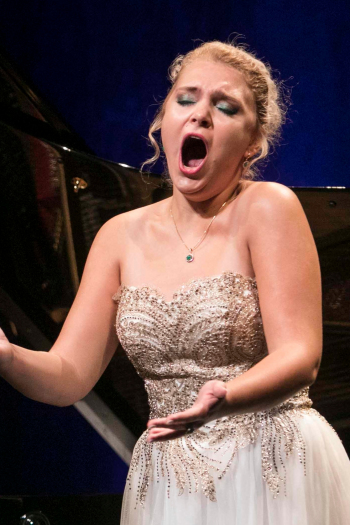 Russian soprano Zoya Petrova started her performance with the aria „Als ein Gott kam Jeder gegangen” by R. Strauss. She interpreted it well, using subtle acting. Then she performed K. Szymanowski’s aria „Uśnijcie, krwawe sny”. The singer's voice had a warm timbre and ease in high tessitura, fitting the characteristic vocalise in Roxana's song. Unfortunately, when the accompaniment became denser, the balance between the voice and the piano was unfavorable. As the last piece, the soloist presented Vocalise, composed by herself. The piece was musically interesting and perfectly interpreted. The lack of words did not prevent the presentation of an interesting dramaturgy. It seemed to be the story of an argument between two characters - one haughty and the other genuinely resentful.
Russian soprano Zoya Petrova started her performance with the aria „Als ein Gott kam Jeder gegangen” by R. Strauss. She interpreted it well, using subtle acting. Then she performed K. Szymanowski’s aria „Uśnijcie, krwawe sny”. The singer's voice had a warm timbre and ease in high tessitura, fitting the characteristic vocalise in Roxana's song. Unfortunately, when the accompaniment became denser, the balance between the voice and the piano was unfavorable. As the last piece, the soloist presented Vocalise, composed by herself. The piece was musically interesting and perfectly interpreted. The lack of words did not prevent the presentation of an interesting dramaturgy. It seemed to be the story of an argument between two characters - one haughty and the other genuinely resentful.
Magdalena Pluta | mezzo-soprano
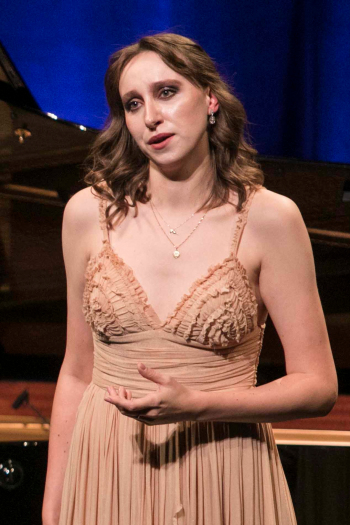 A beautifully played by Alexander Teliga introduction to the romantic song from the cycle „Tri Ukrainski kolyskowi” by V. Vyshynsky began the performance of mezzo-soprano Magdalena Pluta. Her soft, velvety voice perfectly harmonized with the subtle playing of the pianist. Another piece presented by the soloist was recitative and aria „Thy Hand Belinda / When I am laid” by H. Purcell. She led the phrases in an interesting way, and her facial expression went hand in hand with the emotions she conveyed. As the last piece, Magdalena Pluta sang „Mon coeur s'ouvre à ta voix” by C. Saint-Saëns. This aria requires a lot of maturity, which the 28-year-old singer lacked. She had intonation problems throughout the performance, and the top tones did not sound completely at ease.
A beautifully played by Alexander Teliga introduction to the romantic song from the cycle „Tri Ukrainski kolyskowi” by V. Vyshynsky began the performance of mezzo-soprano Magdalena Pluta. Her soft, velvety voice perfectly harmonized with the subtle playing of the pianist. Another piece presented by the soloist was recitative and aria „Thy Hand Belinda / When I am laid” by H. Purcell. She led the phrases in an interesting way, and her facial expression went hand in hand with the emotions she conveyed. As the last piece, Magdalena Pluta sang „Mon coeur s'ouvre à ta voix” by C. Saint-Saëns. This aria requires a lot of maturity, which the 28-year-old singer lacked. She had intonation problems throughout the performance, and the top tones did not sound completely at ease.
Maria Polańska | mezzo-soprano
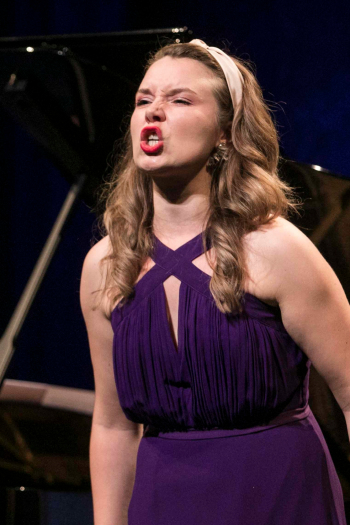 W. Wrzesińska’s song „Na lipę” by was performed second time that day, by mezzo-soprano Maria Polańska and pianist Michał Biel. The soloist sang it sensually, and the accompanying piano sounded magical. Then she presented A. Thomas' aria „Connais-tu le pays”. She had problems with intonation in both compositions. There was a dense vibrato in her voice, which calmed down only in the third piece - G.F. Händel’s „Empio, dirò tu sei”. In this last aria she showed very good coloratures.
W. Wrzesińska’s song „Na lipę” by was performed second time that day, by mezzo-soprano Maria Polańska and pianist Michał Biel. The soloist sang it sensually, and the accompanying piano sounded magical. Then she presented A. Thomas' aria „Connais-tu le pays”. She had problems with intonation in both compositions. There was a dense vibrato in her voice, which calmed down only in the third piece - G.F. Händel’s „Empio, dirò tu sei”. In this last aria she showed very good coloratures.
David Roy | baritone
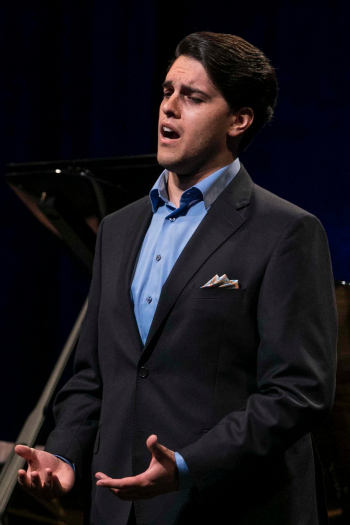 24-year-old baritone David Roy began his performance with an energetic rendition of „Don Juan’s Serenade” by P. Tchaikovsky. His voice sounded even across the range, and the top notes were sung confidently and sonorously. In a fervent prayer, „Boże, Ojcze nasz i opiekunie” by P. Łukaszewski, the soloist, showed off with a beautiful legato and well-planned dynamics. As the last piece he performed recitative and aria „Per me giunto / Io morrò, ma lieto in core” by G. Verdi. He limited his gestures to a minimum, and only the expression contained in his voice and beautiful phrasing expressed the emotions tormenting Marquis of Posa. At one point in the aria, the soloist lost control of the intonation, but quickly returned to the right track.
24-year-old baritone David Roy began his performance with an energetic rendition of „Don Juan’s Serenade” by P. Tchaikovsky. His voice sounded even across the range, and the top notes were sung confidently and sonorously. In a fervent prayer, „Boże, Ojcze nasz i opiekunie” by P. Łukaszewski, the soloist, showed off with a beautiful legato and well-planned dynamics. As the last piece he performed recitative and aria „Per me giunto / Io morrò, ma lieto in core” by G. Verdi. He limited his gestures to a minimum, and only the expression contained in his voice and beautiful phrasing expressed the emotions tormenting Marquis of Posa. At one point in the aria, the soloist lost control of the intonation, but quickly returned to the right track.
Maksymilian Skiba | baritone
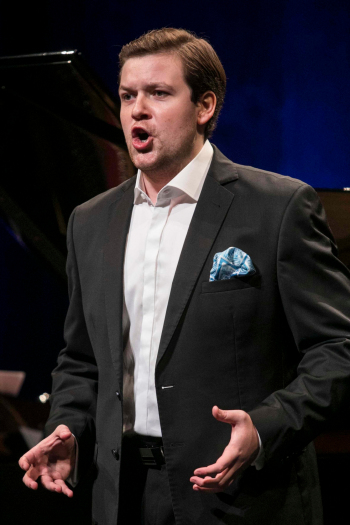 Baritone Maksymilian Skiba began his performance with the song „The Vagabond” by A. V. Williams, and then performed the aria „Liebe, Hassen, Hoffen, Zagen” by R. Strauss. The English and German pronunciation was not correct and the focus he showed in the first stage was lacking. As the third piece, the soloist chose „Questo amor, vergogna mia” by G. Puccini. Unfortunately, this veristic aria lacked relaxed sound and the required volume. He performed much better in Ł. Godyla’s song „Oj, żeglujże żeglarzu”. He seemed more relaxed in this piece and allowed himself a freer and more expressive interpretation.
Baritone Maksymilian Skiba began his performance with the song „The Vagabond” by A. V. Williams, and then performed the aria „Liebe, Hassen, Hoffen, Zagen” by R. Strauss. The English and German pronunciation was not correct and the focus he showed in the first stage was lacking. As the third piece, the soloist chose „Questo amor, vergogna mia” by G. Puccini. Unfortunately, this veristic aria lacked relaxed sound and the required volume. He performed much better in Ł. Godyla’s song „Oj, żeglujże żeglarzu”. He seemed more relaxed in this piece and allowed himself a freer and more expressive interpretation.
Karol Skwara | bass
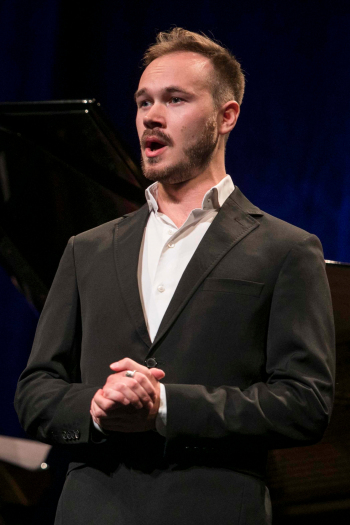 As the first piece in the second stage, Karol Skwara presented P. Łukaszewski’s song „Ciemna noc”. He sang it correctly but failed to build up the suspense. The second piece was completely different - C. Floyd’s aria „I'm a lonely man, Susannah”. He perfectly interpreted the character of the lustful Reverend Blitch. The soloist showed a more lyrical side in A. Rubinstein's aria „Ya tot katoramu vnimala”. He led the legato phrases nicely and delivered the text convincingly. The last piece, „Pesnja o bloche” by M. Mussorgsky, he performed with a pinch of salt, bursting out with mocking laughter every now and then. The artist's strong point was the ease of playing the villains.
As the first piece in the second stage, Karol Skwara presented P. Łukaszewski’s song „Ciemna noc”. He sang it correctly but failed to build up the suspense. The second piece was completely different - C. Floyd’s aria „I'm a lonely man, Susannah”. He perfectly interpreted the character of the lustful Reverend Blitch. The soloist showed a more lyrical side in A. Rubinstein's aria „Ya tot katoramu vnimala”. He led the legato phrases nicely and delivered the text convincingly. The last piece, „Pesnja o bloche” by M. Mussorgsky, he performed with a pinch of salt, bursting out with mocking laughter every now and then. The artist's strong point was the ease of playing the villains.
Dominika Stefańska | mezzo-soprano
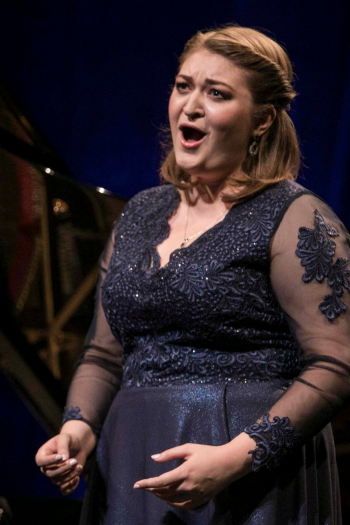 Mezzo-soprano Dominika Stefańska has a beautiful voice and a noble stage presence. She performed the arias „Z tej strony Powiśla” by S. Moniuszko, „Dear God look into my heart” by R. Aldrige and „Stride la vampa” by G. Verdi. Especially in the last piece, one could hear a lot of tension in the voice and a thick vibrato. Also, the soloist had problems with intonation.
Mezzo-soprano Dominika Stefańska has a beautiful voice and a noble stage presence. She performed the arias „Z tej strony Powiśla” by S. Moniuszko, „Dear God look into my heart” by R. Aldrige and „Stride la vampa” by G. Verdi. Especially in the last piece, one could hear a lot of tension in the voice and a thick vibrato. Also, the soloist had problems with intonation.
Jakub Szmidt | bass
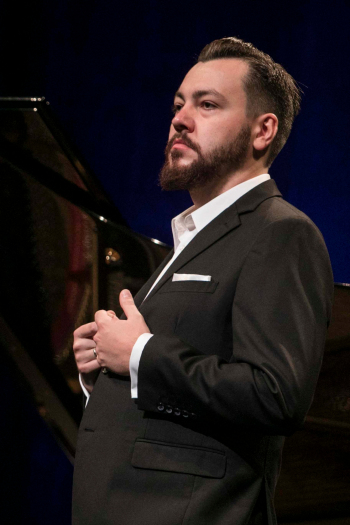 Bass Jakub Szmidt began his performance in the 2nd stage of the Competition with P. Czajkowski’s aria „Ljubwi wsje wozrasti pokorny”. His beautiful voice did not sound completely at ease, but the artist made up for it with his expression and musical sensitivity. There was a lot of effort in the dynamics of the forte. He performed the next song, „Ave Maria” by M. Lorenz, in a gentle and musical way. In the final piece, W.A. Mozart's „Notte e giorno” the soloist focused more on presenting the text than on embellishing the timbre of the sound, thanks to which for the first time his voice sounded more freely.
Bass Jakub Szmidt began his performance in the 2nd stage of the Competition with P. Czajkowski’s aria „Ljubwi wsje wozrasti pokorny”. His beautiful voice did not sound completely at ease, but the artist made up for it with his expression and musical sensitivity. There was a lot of effort in the dynamics of the forte. He performed the next song, „Ave Maria” by M. Lorenz, in a gentle and musical way. In the final piece, W.A. Mozart's „Notte e giorno” the soloist focused more on presenting the text than on embellishing the timbre of the sound, thanks to which for the first time his voice sounded more freely.
Katarzyna Szymkowiak | mezzo-soprano
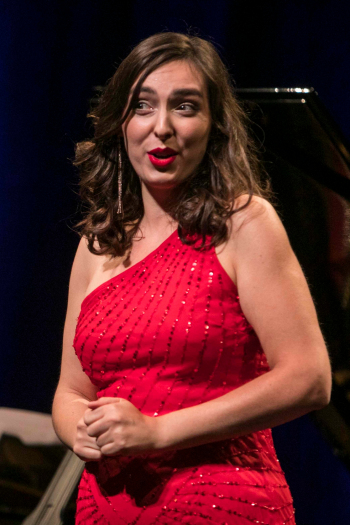 Mezzo-soprano Katarzyna Szymkowiak performed in a repertoire perfectly matched to her vocal qualities. She started her performance with a show of efficient coloratures in recitative and aria „Nacqui all'affanno / Non più mesta” by G. Rossini. Then she presented G. Gershiwn’s aria „Oh Doctor Jesus” by and J. Heggie’s song „Animal Passion”. In both compositions, she skillfully used a musical voice emission, which allowed her to cover up the problems with maintaining sonority on phrases requiring legato singing. While performing, the artist exuded joy and self-confidence, which made her performance a pleasure to listen to.
Mezzo-soprano Katarzyna Szymkowiak performed in a repertoire perfectly matched to her vocal qualities. She started her performance with a show of efficient coloratures in recitative and aria „Nacqui all'affanno / Non più mesta” by G. Rossini. Then she presented G. Gershiwn’s aria „Oh Doctor Jesus” by and J. Heggie’s song „Animal Passion”. In both compositions, she skillfully used a musical voice emission, which allowed her to cover up the problems with maintaining sonority on phrases requiring legato singing. While performing, the artist exuded joy and self-confidence, which made her performance a pleasure to listen to.
Andżelika Wiśniewska | mezzo-soprano
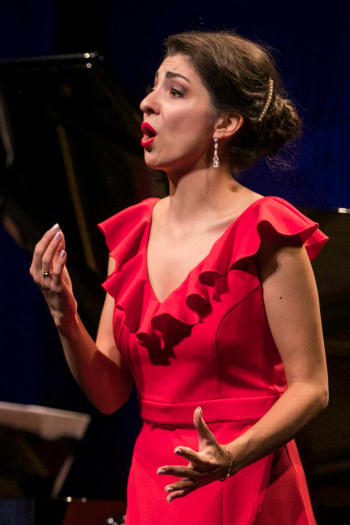 Once again, the duo Andżelika Wiśniewska and Paweł Sommer created a magical atmosphere on the stage. They started with B. Britten’s song „Sephestia's Lullaby”. It lacked a clearer diction by the singer, but the musical performance was interesting. Then they presented J. Massenet’s aria „Werther, Werther! .. Qui m’aurait dit la place”. Despite the fact that the mezzo-soprano's voice is not yet ripe for Charlotte's part, she coped well with the aria. She clearly has an acting talent and a beautiful voice which she can use freely. At the end, the artists performed an ethereal song „Im Herbst” by P. Szymanski. The delicate sounds of the piano perfectly filled the suspenseful pauses in the soloist’s singing. During this piece, time stood still for a moment.
Once again, the duo Andżelika Wiśniewska and Paweł Sommer created a magical atmosphere on the stage. They started with B. Britten’s song „Sephestia's Lullaby”. It lacked a clearer diction by the singer, but the musical performance was interesting. Then they presented J. Massenet’s aria „Werther, Werther! .. Qui m’aurait dit la place”. Despite the fact that the mezzo-soprano's voice is not yet ripe for Charlotte's part, she coped well with the aria. She clearly has an acting talent and a beautiful voice which she can use freely. At the end, the artists performed an ethereal song „Im Herbst” by P. Szymanski. The delicate sounds of the piano perfectly filled the suspenseful pauses in the soloist’s singing. During this piece, time stood still for a moment.
Sylwia Ziółkowska | soprano
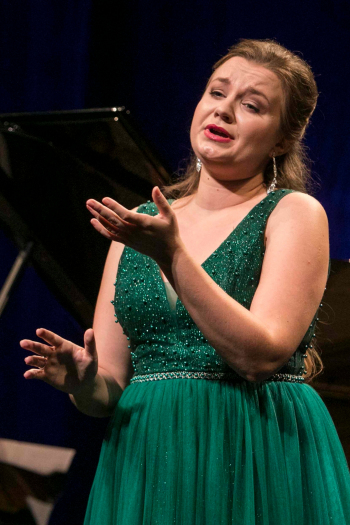 Soprano Sylwia Ziółkowska started her performance with G. Verdi's aria „Sul fil d'un soffio etesio”. This piece was a perfect match for the bright, subtle timbre of her voice. She sang it musically, but there was a lot of vibrato in the sound and she had problems with keeping the intonation. As the second piece she chose S. Rachmaninoff's „Spring Waters”. The thick accompaniment of the piano provoked her to forcefully sing, which emphasized the sharp sound in her voice. The third piece was „Psalm 150” by H.J. Botor. The high tones at the end of the song sounded as though it was difficult for the soloist to sing them.
Soprano Sylwia Ziółkowska started her performance with G. Verdi's aria „Sul fil d'un soffio etesio”. This piece was a perfect match for the bright, subtle timbre of her voice. She sang it musically, but there was a lot of vibrato in the sound and she had problems with keeping the intonation. As the second piece she chose S. Rachmaninoff's „Spring Waters”. The thick accompaniment of the piano provoked her to forcefully sing, which emphasized the sharp sound in her voice. The third piece was „Psalm 150” by H.J. Botor. The high tones at the end of the song sounded as though it was difficult for the soloist to sing them.
Chaoran Zuo | tenor
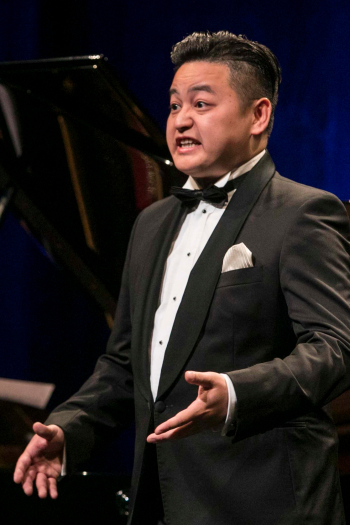 Chinese tenor Chaoran Zuo performed the arias „Mes amis, écoutez l'histoire” by A. Adam and „Gdy ślub weźmiesz z twoim Stachem” by S. Moniuszko. The soloist has a loud voice with an interesting timbre and great diction. Unfortunately, he often had problems with intonation and there was no legato in the phrasing. As the last piece, he presented an aria by a Chinese composer Z. Zhang entitled „I am ashamed that I had let my mother down”. The piece was very dramatic and the soloist interpreted it very well. Even without knowing Chinese, you could feel the strong emotions tormenting the character played by the singer.
Chinese tenor Chaoran Zuo performed the arias „Mes amis, écoutez l'histoire” by A. Adam and „Gdy ślub weźmiesz z twoim Stachem” by S. Moniuszko. The soloist has a loud voice with an interesting timbre and great diction. Unfortunately, he often had problems with intonation and there was no legato in the phrasing. As the last piece, he presented an aria by a Chinese composer Z. Zhang entitled „I am ashamed that I had let my mother down”. The piece was very dramatic and the soloist interpreted it very well. Even without knowing Chinese, you could feel the strong emotions tormenting the character played by the singer.
Adriana Banásová | soprano
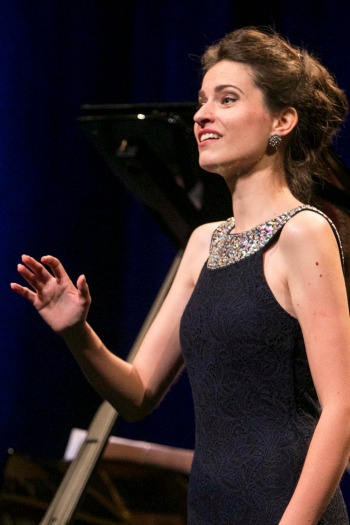 Slovak soprano Adriana Banásová has a loud voice with a beautiful timbre. She performed S. Moniuszko's aria „On tu przybywa”, L. Čekovska’s aria „How should I true love know” as well as recitative and aria „De cet affreux / Pleurez, mes yeux!” By J. Massenet. Her performance was graceful and her voice sounded more saturated than in the previous stage. Unfortunately, it lacked good diction and precise intonation.
Slovak soprano Adriana Banásová has a loud voice with a beautiful timbre. She performed S. Moniuszko's aria „On tu przybywa”, L. Čekovska’s aria „How should I true love know” as well as recitative and aria „De cet affreux / Pleurez, mes yeux!” By J. Massenet. Her performance was graceful and her voice sounded more saturated than in the previous stage. Unfortunately, it lacked good diction and precise intonation.
Justyna Bluj | soprano
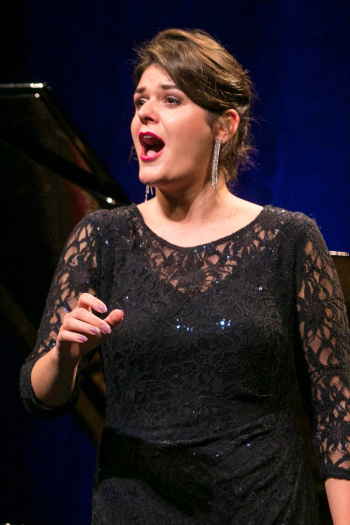 Soprano Justyna Bluj presented a great singing culture. The performance began with K. Szymanowski’s song „Winds of May”. She rendered it with a saturated sound, delivering the text legibly. Then she sang „Ecco respiro appena / Io son l'umille ancella” by F. Ciléa and „Niet, nichevo nie nada / Otchevo eta prizdie nie znala” by P. Czajkowski. She showed beautiful legato in both of them and led her warm sounding voice calmly. Only the top notes sounded strained. She sang the last piece, „Kleyner Yosem” by E. Pessen, very movingly.
Soprano Justyna Bluj presented a great singing culture. The performance began with K. Szymanowski’s song „Winds of May”. She rendered it with a saturated sound, delivering the text legibly. Then she sang „Ecco respiro appena / Io son l'umille ancella” by F. Ciléa and „Niet, nichevo nie nada / Otchevo eta prizdie nie znala” by P. Czajkowski. She showed beautiful legato in both of them and led her warm sounding voice calmly. Only the top notes sounded strained. She sang the last piece, „Kleyner Yosem” by E. Pessen, very movingly.
Ketevan Chuntishvili | soprano
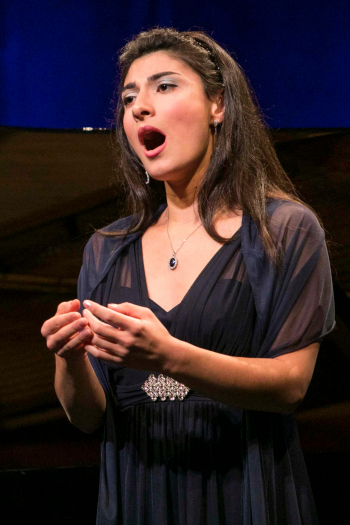 The performance of the Georgian soprano Ketevan Chuntishvili showed that the soloist interprets the pieces very well, and that her voice with a characteristic timbre sounds confident and supported. As her first piece she performed K. Szymanowski's „Uśnijcie, krwawe sny”. Although the vocalise that opened the song sounded out of tune, the singer quickly regained control over her singing. She then made the audience brooding with her interpretation of W. Rhim’s song „Hochroth”. The last piece, „S padruzkami pa jagodu” by N. Rimsky-Korsakov, was performed in a graceful, clear, girlish-sounding voice. Throughout the whole presentation, the soloist adapted her voice to the content of the songs performed, without compromising on its correct impostation.
The performance of the Georgian soprano Ketevan Chuntishvili showed that the soloist interprets the pieces very well, and that her voice with a characteristic timbre sounds confident and supported. As her first piece she performed K. Szymanowski's „Uśnijcie, krwawe sny”. Although the vocalise that opened the song sounded out of tune, the singer quickly regained control over her singing. She then made the audience brooding with her interpretation of W. Rhim’s song „Hochroth”. The last piece, „S padruzkami pa jagodu” by N. Rimsky-Korsakov, was performed in a graceful, clear, girlish-sounding voice. Throughout the whole presentation, the soloist adapted her voice to the content of the songs performed, without compromising on its correct impostation.
Shira Cohen | soprano
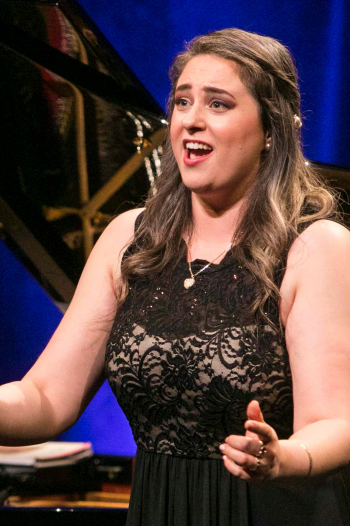 At the beginning of the performance, Israeli-Czech soprano, Shira Cohen, intriguingly announced in English the context of the last piece to be sung in her mother tongue. As her first piece, she performed R. Wagner's aria „Einsam in trüben Tagen”, then recitative and aria „Qual fiamma / Stridono lassà” by R. Leoncavallo. In both cases, it is doubtful whether this repertoire is suitable for her bright-sounding voice. As the last piece, she performed the announced aria „Elohim Medaber el Chava” by D. Sebba. There was a thick vibrato in the singer's voice, and the top notes sounded sharp.
At the beginning of the performance, Israeli-Czech soprano, Shira Cohen, intriguingly announced in English the context of the last piece to be sung in her mother tongue. As her first piece, she performed R. Wagner's aria „Einsam in trüben Tagen”, then recitative and aria „Qual fiamma / Stridono lassà” by R. Leoncavallo. In both cases, it is doubtful whether this repertoire is suitable for her bright-sounding voice. As the last piece, she performed the announced aria „Elohim Medaber el Chava” by D. Sebba. There was a thick vibrato in the singer's voice, and the top notes sounded sharp.
Adrian Domarecki | tenor
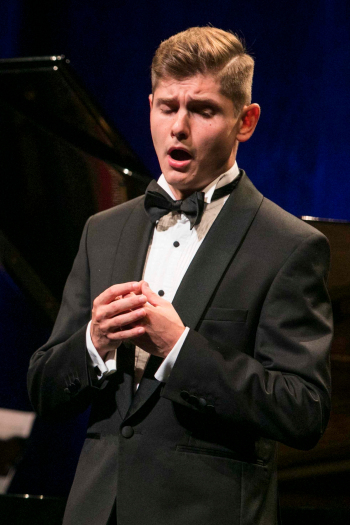 Tenor Adrian Domarecki started his performance with M. Mołodwyńska-Wheeler’s song „A jeżeli nic”. He interpreted it with his whole being: with gestures, mimicry and timbre saturated with emotions. At times, the emotions took away the full control over his voice and provoked him to push his voice, causing detriment of timbre and incorrect intonation. In a similar way he performed the other two arias: G. Donizetti’s „Una furtiva lagrmia” and P. Tchaikovsky’s „Kuda, kuda wy udalilis”.
Tenor Adrian Domarecki started his performance with M. Mołodwyńska-Wheeler’s song „A jeżeli nic”. He interpreted it with his whole being: with gestures, mimicry and timbre saturated with emotions. At times, the emotions took away the full control over his voice and provoked him to push his voice, causing detriment of timbre and incorrect intonation. In a similar way he performed the other two arias: G. Donizetti’s „Una furtiva lagrmia” and P. Tchaikovsky’s „Kuda, kuda wy udalilis”.
Olga Dyadiv | soprano
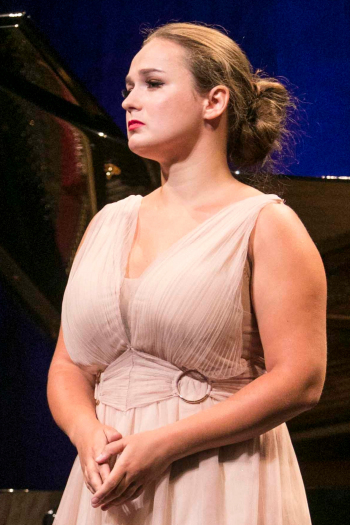 Ukrainian soprano Olga Dyadiv together with the pianist Dominika Peszko built up suspense in the aria „Ombre delle ceneri” by M. Kolomiiets. They led beautiful phrases and inspired one another to achieve the entire color palette. In this piece, as well as in the following, the soloist's midrange didn’t sound well supported, and the voice became sonorous only in the high tessitura. It was especially noticeable in K. Szymanowski’s aria „Uśnijcie krwawe sny” with denser piano accompaniment. At the end, Olga Dyadiv performed the song „Amor” by R. Strauss, which brought out her clear diction and the ability to sing coloratures.
Ukrainian soprano Olga Dyadiv together with the pianist Dominika Peszko built up suspense in the aria „Ombre delle ceneri” by M. Kolomiiets. They led beautiful phrases and inspired one another to achieve the entire color palette. In this piece, as well as in the following, the soloist's midrange didn’t sound well supported, and the voice became sonorous only in the high tessitura. It was especially noticeable in K. Szymanowski’s aria „Uśnijcie krwawe sny” with denser piano accompaniment. At the end, Olga Dyadiv performed the song „Amor” by R. Strauss, which brought out her clear diction and the ability to sing coloratures.

